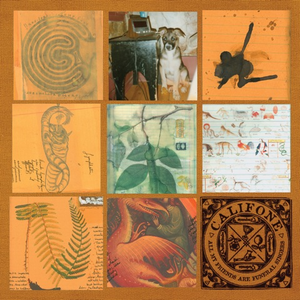Califone is the musical project of former Red Red Meat frontman Tim Rutili. Its regular and rotating contributors include many former members of Red Red Meat and some members of other Chicago bands, such as Tortoise. Their music is less rooted in blues-rock than Red Red Meat and is more directly inspired by experimental music and early American folk music as can be found on Harry Smith's Anthology of American Folk Music.
Califone's current lineup includes Joe Adamik (drums), Jim Becker (banjo, violin), Ben Massarella (percussion), and Tim Rutili (vocals, guitar, keyboards). Each member is a multi-instrumentalist.
Tim Rutili has collaborated with a number of other artists as well. He joined up with Modest Mouse frontman Isaac Brock and others in 2002 to release the album Sharpen Your Teeth under the band name Ugly Casanova. Some members also toured with Freakwater and served as a backing band to record the album Thinking of You in 2005. In 2006, Tim Rutili teamed up with Wil Hendricks and Michael Krassner under the name The Unseen Hand to record the soundtrack for Rank, a documentary about bullriding. In the same year Califone worked with animator/musician Brent Green on a series of performance art pieces featuring animation, live music, and spoken word. They are also featured on the soundtrack for the movie Stranger than Fiction.
Buñuel
Califone Lyrics
Jump to: Overall Meaning ↴ Line by Line Meaning ↴
The lyrics of Califone's song Buñuel describe the life and work of the Spanish filmmaker Luis Buñuel. The song depicts Buñuel as a skilled craftsman, creating bullets and guns in his home with "careful fingers and eyes getting old." The song also references Buñuel's love of smoking and his contemplation of the stars in tide-pools and the dust in daylight. The lyrics suggest that Buñuel lived through some kind of historic event ("a great plague passes and saves us for later") and that he was deeply admired by the cameras that captured him on film.
The song's chorus emphasizes the idea that Buñuel was most compelling when he stopped "trying to play" and simply allowed himself to be filmed. The lyrics suggest that Buñuel's talent lay not in acting or posing for the camera, but in the work he did behind the scenes - creating powerful, lasting works of art that continue to resonate with audiences today. The song ends by referencing Buñuel's "revolution and lust," suggesting that his creative vision was driven by a desire for change and a passion for life.
Line by Line Meaning
luis buñuel made bullets and guns at home to pass the time away with careful fingers and eyes getting old
Buñuel found solace in making bullets and guns himself to wile away his time in old age, with meticulous attention from his weary eyes and fingers.
smoking the whole time stars in the tide-pools dust in the daylight a great plague passes and saves us for later
As he made bullets, smoking continually, he became aware of the passing of time and the insignificance of individuals, as nature and calamity remain indifferent - with stars glistening in the tide-pools and dust in the daylight serving as reminders.
every camera loves you better when you quit trying to play gunpowder stains lose all sense of time can't seem to recall the function of what you lost yourself in making
Perhaps the artless capturing of life on camera becomes more genuine when one relinquishes their efforts to fulfill an unseen desire, as getting lost in creation and inspiration often lead to a loss of time and a muddling of purpose.
every whorehouse in ever civil war knows better ways to make you wait
Even in the most chaotic and trivial of places, there are those who learn to bide their time, finding their own methods of waiting, be it in a brothel during a war or in solitary creation.
luis buñuel watching the wine glass tremble as the train passes by
As the train rattled by, Buñuel observed the trembling of his wine glass, perhaps realizing the transience and tremulousness of life and creation alike.
wizened fingers revolution and lust soul and spine stars in the tide-pools dust in the daylight a great plague passes and saves us for later
Despite the old age and weariness of his fingers, Buñuel sought to revolutionize and inspire, through the subjects of both passion and the human soul, all while being constantly reminded of the temporal nature of existence by the stars and dust around him and the ever-looming potential threats of plagues or disaster.
every camera loves you better when you quit trying to play every whorehouse in every civil war knows better ways to make you wait
Again emphasizing the virtue of relinquishing unnecessary effort and accepting the futility of struggling to wait, all while highlighting the universality of the human experience through the example of war and sex work.
Contributed by Julian N. Suggest a correction in the comments below.
